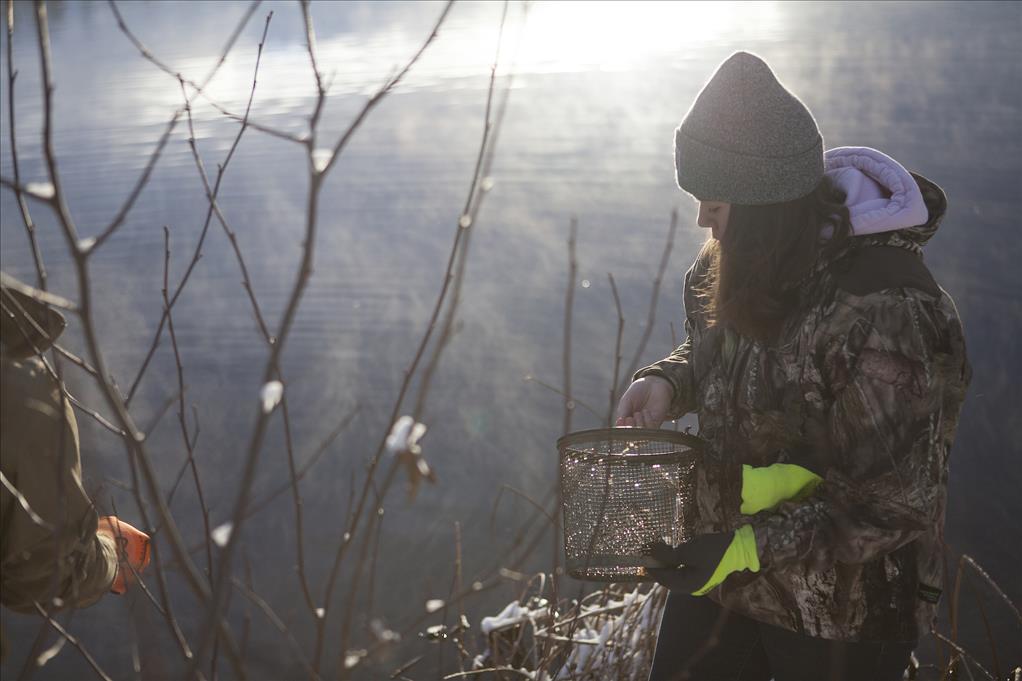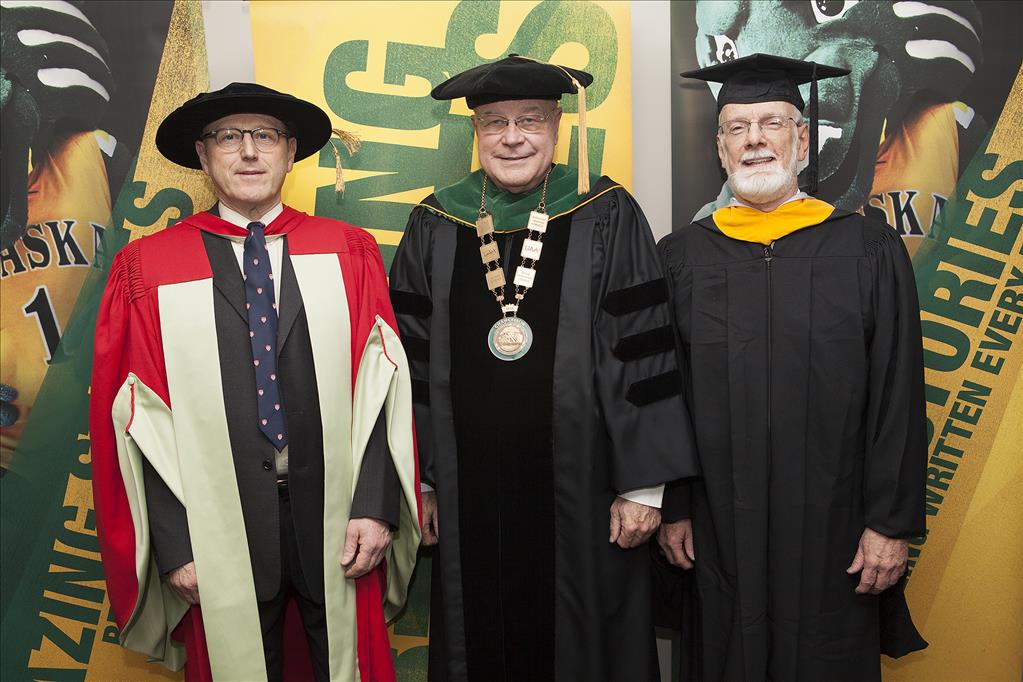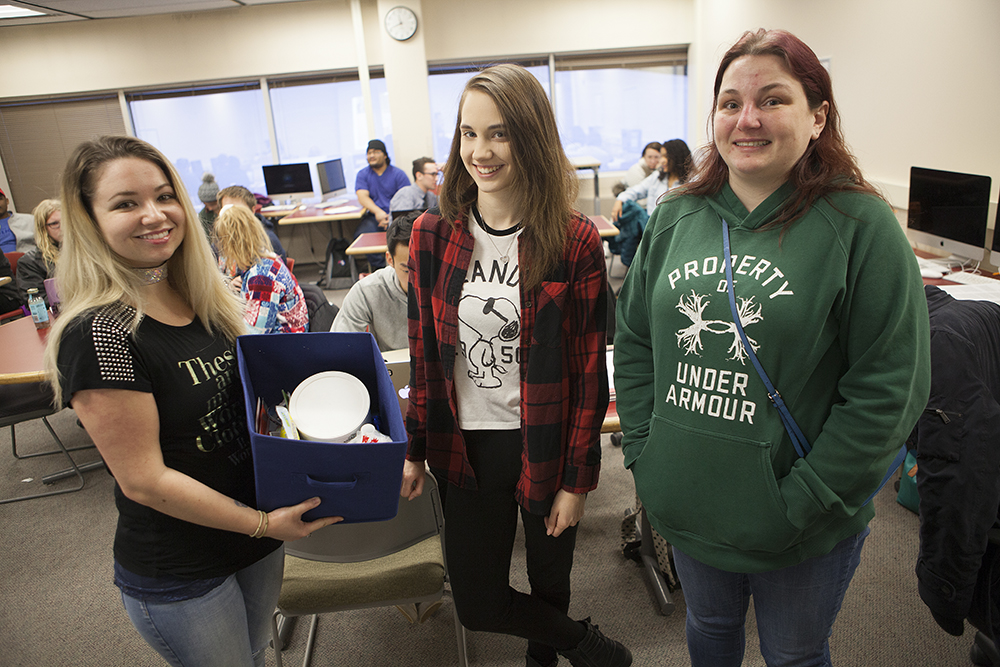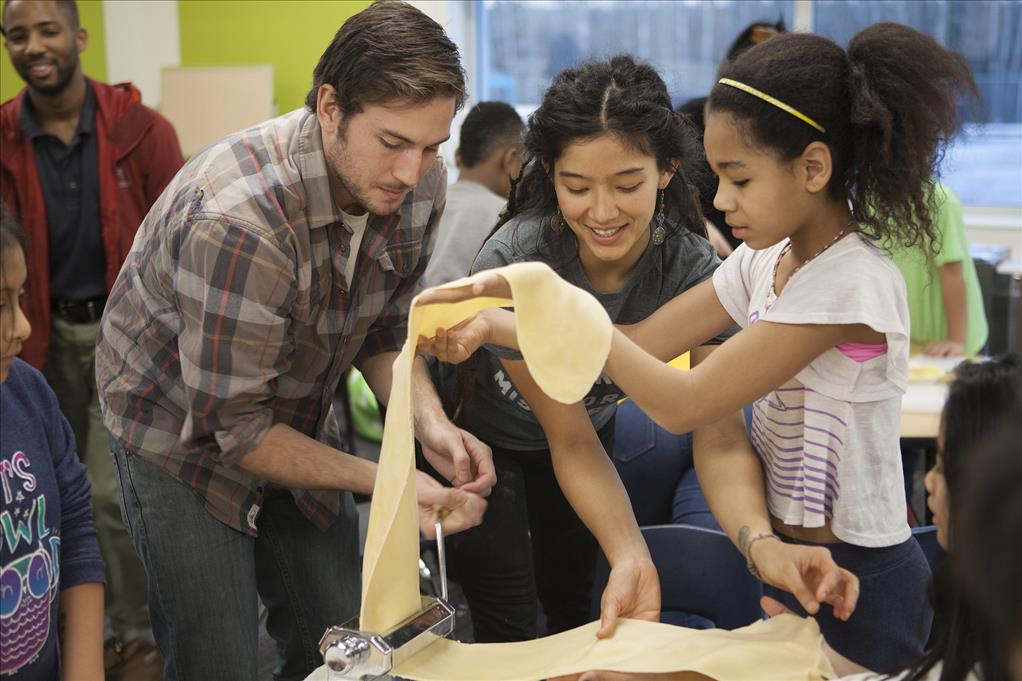A look back at UAA's spring 2016 history conference and undergraduate scholarship
by Kathleen McCoy |
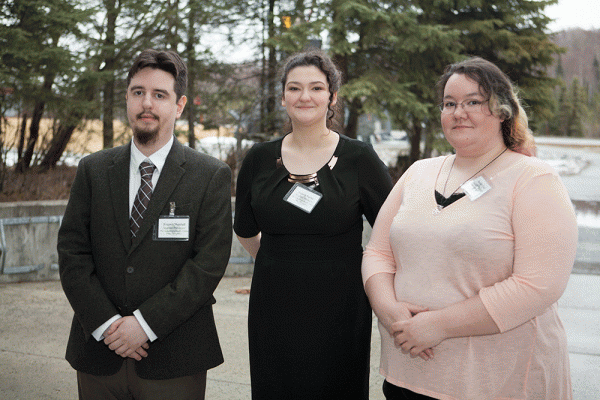
Frazier Manfull, Celeste Earley and Heather Teel were among the undergraduates who presented at Phi Alpha Theta's conference sponsored by the UAA Department of History. (Photo by Philip Hall / University of Alaska Anchorage)
So many good things happen in spring semester at UAA, it can be hard to keep up.
Each year, Professor Rachael Ball reaches out to alert the UAA community that the Phi Alpha Theta history conference is on the calendar. This is fourth statewide conference and the Department of History's third year of support. UAF students typically participate. Find images of the successful event at the history department's Facebook page.
Here is background on this year's conference that occurred March 24-25 at UAA, along with brief interviews with three of the undergraduate scholars who presented there, about their work and their passion for history.
Phi Alpha Theta
Phi Alpha Theta is the national history honor society. UAA has an active chapter that serves as a meeting ground between faculty and students. The annual conference is their big effort, but the group also hosts student and faculty gatherings like board game nights for bouts of History Jeopardy and Trivial Pursuit.
Ray Ball is the honor society's faculty advisor and she serves as the faculty organizer for the department's Phi Alpha Theta conference. Senior Celeste Earley presented at the conference, but also served as its student director this year. The conference and other Phi Alpha Theta events are always open to all interested students, Ray said.
Traditionally, a reliable and self-sufficient student might just get the conference leadership tap from Ray. That's what happened with Celeste this year. She earned internship credit for her conference organizing activities through the English Department's A495 internship class.
New internship opportunities
But come the fall, the history department will be able to offer its own internship opportunities. Ray expects future student conference directors to apply in the fall for the spring organizing role. She said she considers it a great resume builder and an opportunity for a student to stretch professionally.
Beyond the conference, UAA history students will be able to earn internship credit by volunteering time and talent at community activities like the Anchorage School District's annual history day, where they typically serve as judges for a variety of high school history projects.
The UAA conference this year featured six panels moderated by a faculty member and organized to highlight and explore the academic work of UAA students:
- Fascism and Film in the Age of Mass Society (chaired by Paul Dunscomb)
- Case Studies in the History of Slavery (chaired by Songho Ha)
- Cultural Conflict and Native American Identity (chaired by Stephen Haycox)
- Politics and Policy in American History (chaired by Ian Hartman)
- Revolt Rebellion and Writing on the Medieval and Early Modern World (chaired by Ray Ball)
- Identity, Acculturation and Resistance (chaired by Bill Myers)
Stephen Haycox offered a public lecture Thursday evening on "Battleground Alaska: Fighting Federal Power in America's Last Wilderness." Thomas Cox of Sam Houston State University gave the keynote address Friday at lunch, titled "Middle Men in the Middle Kingdom: The American Merchant Community in China during the First Opium War, 1939-1842."
Meet the scholars
Celeste Earley and midwifery: We already mentioned that Celeste served as this year's conference student director. Now, imagine taking on that huge job while working full time? That's exactly what Celeste did.
As a history major and women's study minor, Celeste says she has had a steady job since she turned 14. For the past three years, she's worked full time at the Anchorage Museum as their assistant visitor services manager. She plans a career in museum work.
Anchorage born and home schooled until 10th grade, Celeste graduated in 2012 from Stellar Secondary School. Attending UAA was an economic decision; she said her parents had saved for her college career so she wouldn't face school debt after she graduates in December 2016.
Celeste says she was a history major upon arrival at UAA. From a young age, she was fascinated by the stories of kings and queens. That developed into a more thorough examination of the social, political and gender politics in early modern and medieval history.
"I loved the mystery of it," she said, explaining that academic history requires a lot of detective work. Instead of reading accounts in history books, she relished going to original source documents, like manuscripts, letters, some books, and even an online subscription of scanned early English books that allows scholars around the world to read them. Her research project developed out of the senior seminar with Professor Ball, who teaches most of the medieval and early modern classes at UAA.
Celeste's paper examined early midwifery manuals and why they were written by men. "That just stunned me," she said. Her own mother has a career in midwifery, Celeste explained, and she's been interested in the topic as she grew up. But how could men write manuals about childbirth when they aren't even allowed in the birthing chamber, she wondered.
Her research showed that in Europe during the Scientific Revolution (1500s-1700s), "science bloomed." Despite reliable reputations as female midwives, Celeste documents how male doctors trained at male-dominated universities had an advantage over female midwives, able to learn new knowledge and test new equipment. They started writing birthing manuals. Wealthier women who could afford doctors began having them attend at their births. Medical schools began to view midwifery as a public health threat. The first midwife manual written by a woman didn't happen for another 100 years, she learned.
Celeste found interacting with other history students especially rewarding. "The was my first conference. It was so much fun, I had a great time. I tend to get stuck in my own field of history and I hyper focus. Being at the conference, I could see what everyone else was passionate about. It made me really proud of the history department."
Frazier Manfull and Fascist Japan: Frazier started out as a justice major, but the history general electives always satisfied, so in May he'll graduate with both majors.
"To be perfectly honest, a video game got me into history," he said with a laugh. "Before I even came here, I got into Europa Universalis 3 by Paradox. A 15th-century strategy game, it lets a gamer take control of one of seven European nations from 1492-1792, gaining power through trade, military might, diplomacy and colonialism.
"After I started studying history, I learned that a lot of [the game] wasn't all that accurate, but it was grounded in fact enough to get me hooked," he said.
Frazier is a graduate of Family Partnership Charter School, and started taking classes at UAA as a high school sophomore. He is also is a protégé of Professor Paul Dunscomb, an expert on east Asian studies. Dunscomb's guidance led Frazier to explore whether Japan was a fascist nation during World War II.
"If you ask the man on the street, the answer is likely yes," Frazier said. But among academics, fascism has a very specific definition. There are a lot of arguments over it. "If you ask 10 academics, you'll get 11 answers," he said. Frazier ended up arguing that Japan was fascist, but it was not a clone of either Germany or Italy.
This year's conference was Frazier's second time to present his own work. He'll also return to Student Showcase this year, and present his paper in Bellingham, WA at the Phi Alpha Theta Northwest Regional Conference. He applied and received an undergraduate research grant to acquire some of his history sources and to attend the regional conference to further vet his paper.
Frazier is vice president of UAA's chapter of Phi Alpha Theta and says the group plans an upcoming movie night to view "Ghengis Khan," a movie about the founder of the Mongolian Empire "and every actor in it is white," he noted, clearly an inaccuracy that history majors can enjoy.
What truly hooked Frazier on history? "I like it because of the stories," he said. "It's filled with human narratives that are both mundane and bizarre."
He hopes to study history in graduate school, but in the near term, will lean next on his justice degree for a job. "I've been going to school for a long, long time," he said. "It'll be good to work for awhile."
His advice for undergraduates?
"It's the thing I should have done right from the beginning: Get to know your professors. It took me a few years. Now I know them much better."
Heather Teel and indigenous cultural conflicts: Heather stumbled into history. Her original major was Japanese, and she enjoyed a year abroad at Hokaido, Japan. "I like languages. I'm good at them, I like breaking them down."
She thought translation work would be interesting, but then had second thoughts. She took a U.S. history class from Professor Ian Hartman and got hooked.
"He's an excellent lecturer. And his means of showing you how to write a research paper for upper division, that was critical. He shows how history can apply to modern-day issues, and how we can use it to inform ourselves," she said.
Heather's conference paper was titled "AIM for Cultural Conflict," based on the American Indian Movement.
"My paper addresses lots of issues in the civil rights movement at the time. The American Indian Movement was a great way to simplify the intense cultural conflict among and between the American Indians and the government. The government treats groups like this as if they are homogenized, but they are not. Treating them this way hurts government policy and function," she said.
Her interest stems from her own personal background. Both parents have family ties to Indian tribes. Her grandfather grew up for a time on a reservation. But today, the ties are nearly severed. "We have lineages...but no real contact or awareness," she said.
Heather was born in Arizona but raised in Belgium with a military family. Her dad retired to Alaska and brought the whole family. She graduated from Steller Secondary School, and tried college but wasn't quite ready. But when she got to UAA, this double major was ready to go.
The conference has value for Heather because it allows students to get feedback on their work. "You work an entire semester on something, and only the professor reads it and maybe you do a quick class presentation. But at the conference, everyone's interested. Other professors attend and push the analysis."
Heather, a self-described nontraditional student, is 33. She plans to take the next year off to work on her own fiction. Her advice to undergraduates following in her footsteps is to not panic about school. In her first semester in history, her father became ill just as finals and papers were due. Research papers were new for her, and she did panic. "I thought I had turned in the worst thing ever," only to learn that it was hardly a disaster. So brace yourself, pace yourself, keep moving forward.
Written by Kathleen McCoy, UAA Office of University Advancement
 "A look back at UAA's spring 2016 history conference and undergraduate scholarship" is licensed under a Creative Commons Attribution-NonCommercial 4.0 International License.
"A look back at UAA's spring 2016 history conference and undergraduate scholarship" is licensed under a Creative Commons Attribution-NonCommercial 4.0 International License.










